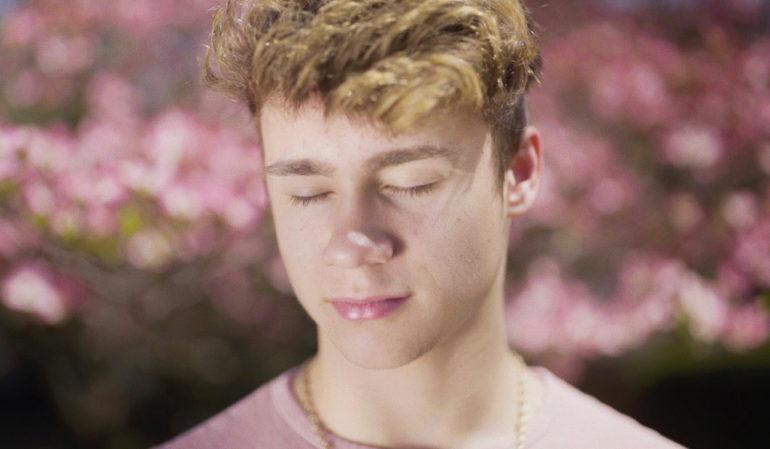Sundance Film Review: ‘Jawline’
By Amy Nicholson
LOS ANGELES (Variety.com) – Before bedtime in Kingsport, Tenn., 16-year-old Austyn Tester shoots an inspirational selfie video just for himself. “It is 10:06 pm, and I am not famous right now,” admits Austyn. Yet, the aspiring social media star plans to be — soon — via filming daily live streams telling young girls to believe in themselves and chase their dreams, all delivered with sincerity and a batting of eyelashes underneath his banana soft-serve bangs. Shy teens gobble up his adamant positivity, and by the end of Liza Mandelup’s documentary “Jawline,” this naive boy who’s never been on a plane, had his eyebrows threaded, or hugged a paying stranger will accomplish all three.
Success? Not to Mandelup, whose portrait of would-be influencers and their young female disciples is #nofilter, especially when she introduces us to 21-year-old manager Michael Weist, the fast-talking, desk-pounding reincarnation of Louis B. Mayer who lives in a fast-food-strewn mansion in Los Angeles with several of his Instagram stars and likens filming branded content for Old Navy to, “like, the Gold Rush.” These demi-celebrities don’t have any actual talents. On tour, the guys spray silly string, take pictures with the crowd, and, at most, do a backflip. But even if you’ve never heard of, say, grinning twins Julian and Jovani Jara, it’s hard to deny that promoters like Weist have tapped into something when you watch a girl burst into tears running into one of his creations on Rodeo Drive, where the barely-drinking-age mogul is shopping at Chanel.
Mandelup captures the reflection of the universe in Austyn’s eyes when he visits the planetarium. He wants to see the world, and the only way out of Tennessee is selling his charm. Her images of these boys taking selfie after selfie have the sun-dappled beauty that these kids would kill for. She embraces the ethereal feel of today’s aspirational ideal — all delicate pastels and airy synthesizers — while muddying this curated fraudulence by panning to the mess outside of the frame: the clothes heaped on Austyn’s floor, the mother fretting that he’s become lazy and narcissistic, the stampede of kittens who seem to multiply in the corners of their rundown home. Austyn makes his rural life look idyllic. Mandelup wants you to wonder how it smells.
“Jawline” prods the contradictions of the authenticity-industrial complex. The most popular Internet personalities encourage kids to be true to themselves. But the Internet celebs themselves have matching shag haircuts and plastic smiles. Influencer culture is a pyramid scheme of positivity. Boys boost their own happiness by getting likes for telling other people to be happy while masking their own depression. Half of Weist’s job is hectoring his photogenic slackers to be cheerful, dammit. And if they can’t be themselves — er, be who Old Navy needs them to be — then, shrugs Weist, “Talent is always replaceable.”
Even Austyn, who dreams of escaping to California and upgrading his lifestyle from sharing a bed with his brother to, well, sharing a bunkbed with some other dude, trades truth for fans. At the start of the documentary, he asks his sensible older brother Donavan to tell him a joke while he takes his picture so he can genuinely laugh. By the end, he’s bragging to girls that he’s all dressed up in his nicest khaki slacks. Mandelup silently observes that he’s actually in swim trunks.
“I’m going to fake it till I make it!” vows Austyn. At first, “Jawline” also feels committed to his rise. Mandelup changes her intention so gradually that the third act of the film feels a little aimless. Still, she’s smart to momentarily give the mic to the female fans to explain their devotion, though the uniformity of their answers is depressing. Each has been bullied. Each has a longing for connection which can’t be fulfilled by a pixelated face who belongs to thousands of other girls. And when Austyn throws together his first slapdash meet-and-greet at a local mall, each girl who shows up wants something from him that can’t be articulated, a hunger that teeters on the edge of resentment. This kid isn’t yet equipped for that kind of interaction. When one hands him a wad of cash to get on a motorized stuffed horse, he awkwardly climbs aboard and rides away.

